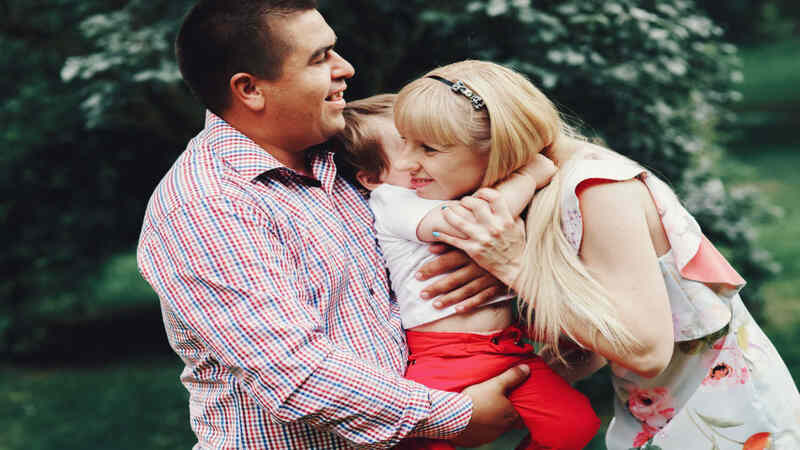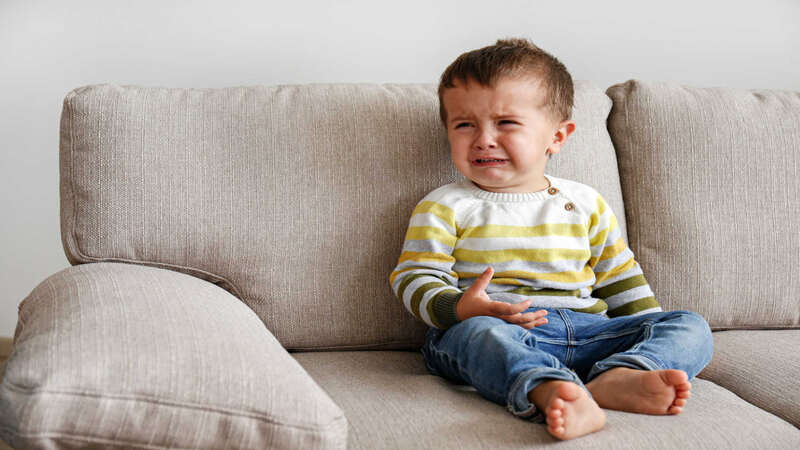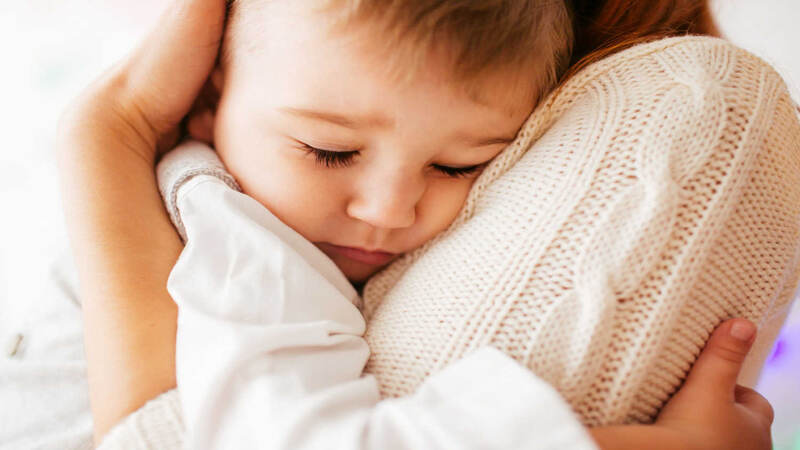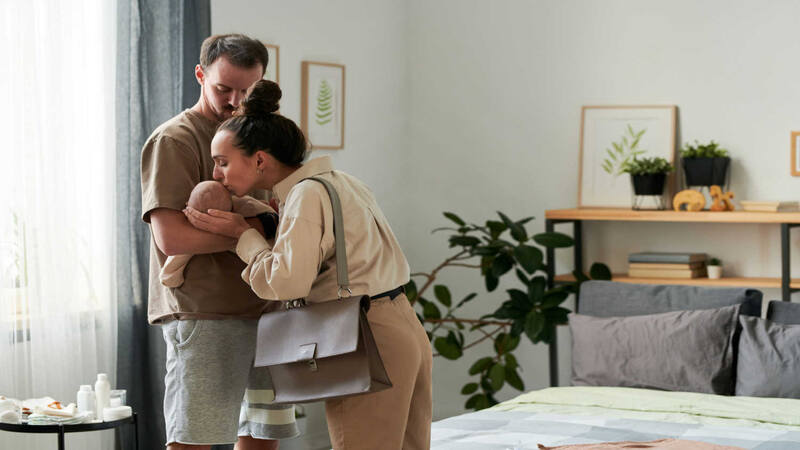
A time will come when your baby starts behaving oddly and becomes clingy. They often start crying when left alone and fear people. These are some signs of separation anxiety in babies, a common part of the baby’s developmental stage. The anxiety symptoms will go away as babies grow up. But sometimes, parents may need to take some steps to tackle the situation.
This post will discuss separation anxiety in babies, common signs, causes, and tips to prevent it. Let’s get started.
What is Separation Anxiety in Babies?
This refers to the anxiety in babies that they experience when parents or caregivers leave them at daycare or any other unfamiliar place. Babies may experience worry or restlessness when left with somebody new even in familiar settings.
Babies experiencing anxiety may fear people around them and become clingy. They may start crying when you or another trusted caregiver leaves them. Separation anxiety doesn’t kick in till the babies grow up a little. As for infants, it is difficult to distinguish if they are away from their parents or caregivers.
Usually, babies start experiencing separation anxiety when they are around 9 months old. As they grow, they form a strong attachment to their parents and the people around them.
Your tiny one desires to stay with you all the time which is why they get uncomfortable when separated from you. It is safe to say that separation anxiety is nature’s way of keeping the baby safe and preventing them from harm’s way. Some of the babies don’t show signs of anxiety or do not even experience it at all. But some babies do behave differently and show signs of anxiety.
Top Causes of Separation Anxiety in Infants

Separation anxiety usually starts when babies start to recognize faces. They know that you are their primary caregiver and hence want you around them all the time.
So, when you are out of their sight even for a few minutes, they will start looking for you. And when they can’t see you, they will start to cry or fuss.
In most cases, separation anxiety will go away naturally. But certain factors may trigger separation anxiety such as
- New siblings entering into their life
- Unfamiliar surroundings
- Adding a new caretaker
- Shifting to a new location and new home
- Sudden loss of a caregiver or a parent
- Feeling unwell
- Prolonged absence of a caregiver
[Read : When Will My Baby Start Remembering Things And People?]
Signs of Separation Anxiety in Babies

Here are a few signs that your baby is experiencing separation anxiety.
- Your baby starts crying when you leave them or go out of their room.
- The baby is clingier to parents or caregivers when in unfamiliar surroundings.
- Your baby may cry or exhibit restlessness around strangers.
- They may get tensed when you are not around them.
- In addition, your baby may have trouble sleeping if they don’t find you around them.
- They may strongly prefer you to be with them all the time.
[Read : Top 5 Tips For Moms to Cope With A Clingy Baby]
When Does Separation Anxiety in Babies Start?
Although there is no specific time for separation anxiety in babies, it may begin at 8 months or more. However, babies may start experiencing separation anxiety by 4-6 months of age as well. This is because, by 7 months of age, they begin to understand object permanence, that is when they realize that objects and people exist even if they aren’t around them. But they don’t have a clear understanding of time. They don’t know why the caregiver leaves them alone and by what time they will return. Due to this, they start feeling anxious and afraid of unfamiliar objects, people or surroundings.
Suppose you leave the room, they know you exist, but they still become upset and may start crying when they do not see you around them. This is a situation when babies start experiencing separation anxiety.
[Read : Object Permanence in Babies]
Top 5 Tips to Handle Separation Anxiety in Babies

You cannot stop the baby from feeling separation anxiety. However, you can try some measures to comfort and calm down your baby.
1. Practice Separation
Before leaving your baby for an outing or work, practice the act of separation by playing peek-a-boo with your baby. This will help them understand that you will return even if you are away from them for some time.
Another trick you can try is to send their stuffed toy on a ‘journey’. Pretend that the toy has gone somewhere, and then make it appear again. This reunion will further enhance the notion of ‘returning’ after a gap. Once you have practised these tricks with the baby, try leaving them for a shorter period of time with a person they trust.
2. Create a Goodbye Routine
A routine of any kind is good for babies. Keeping this in mind, you can create a goodbye routine of your own which will help your baby to soothe once you step away from them. Things you can try for your goodbye routine are
- Give your baby a hug and kiss whenever you leave.
- Wave at them while leaving the room.
- Recite a poem or a song to them just before exiting the room.
- Communicate to them that you are going away but will be back soon because believe it or not, babies can understand you. This will help them stay calm.
3. Avoid Sneaking Out
Parents’ biggest mistake is leaving or sneaking away from their babies when they are engaged in other activities. This makes babies more anxious when they do not see you around them. Instead, tell them you are going out and give them a goodbye message, so they know you are going out and will be back soon.
4. Stay Calm
While practising separation, you must stay calm. No matter how distressed or anxious your baby is, you need to stay calm to help alleviate their crying. Give them a happy goodbye instead of rubbing off your anxiety on to your baby.
5. Foster Independence
For the baby to be independent, you as a parent also need to let go a little. If you are always around the baby, not letting them out of your sight, then it is natural for the baby to become clingier. Let your baby step away from you a little bit. Stay nearby to keep a watch over them. But avoid being too close to them.
Also, let them go to other trusted family members. Let them play with them, and spend some time with them, without your presence. Because, if you are always keeping them with you and not allowing them to mix with others, they are bound to be clingy. These tricks may help the baby become independent of you, and also understand that even if you are not around them, you will always be back for them.
Separation anxiety in babies is inevitable, and some infants may get stressed out when they don’t find you around. Try to follow these tips to make separation less shocking for them. Practising these things also helps ease their separation anxiety and build a sense of security and trust that you are with them even if you go out.
FAQ’s
1. How Long Does Separation Anxiety Last in Babies?
Most babies outgrow separation anxiety by the time they reach 3 years of age.
2. What Age Can a Baby be Away From Mom?
Babies can be away from moms between 12-24 months of age. However, if your baby is already facing separation anxiety, then it may take longer to accept separation.
3. Do Breastfed Babies Have More Separation Anxiety?
Yes, breastfed babies tend to have more separation anxiety than babies who are not on breastfeed.
Read Also: Stranger Anxiety in Babies – Causes And How to Deal With it
